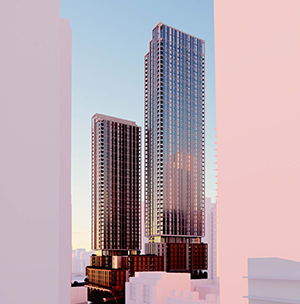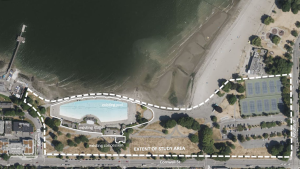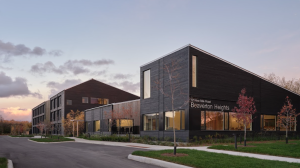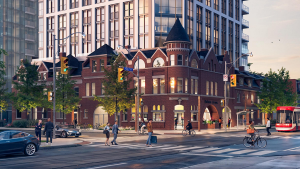Bedeviled by a chronic housing shortage, the City of Vancouver has just launched what it says is a new way of delivering market-price rental housing.
Called the Rental Housing on City-owned Land – Public Benefits Pilot Rezoning Policy, the city says the initiative will not only deliver market rental housing on its land, it will also generate financial returns it can use to address Vancouver’s growing infrastructure deficit.
The initiative is led by the newly-formed Vancouver Housing Development Office (VHDO).

Mayor Ken Sim said in announcement, “By putting our real estate assets to work and thinking outside the box…we’re setting up Vancouver for long-term success, so more families and residents can put down roots and thrive in our city.”
The city recently submitted a rezoning proposal to develop a property on land it owns near the Burrard Bridge, at Pacific Street and Hornby Street.
If all goes according to plan, the proposed 54- and 40-storey buildings could provide up to 1,136 market rental homes, with a mix of studio, one-bedroom, two-bedroom, and three-bedroom units.
Brad Foster, director of market housing at VHDO, says the Pacific and Hornby project is one of five market-rental pilot program sites under its wing at the moment.
The others are located at Main Street and Terminal Avenue (near Science World), Granville Street and Pacific Street (the southern edge of downtown), 2400 Kingsway (the site of the 2400 Motel), and Granville Street and 67th Avenue in Marpole.
At the Main and Terminal site, the city is planning to build a large multi-family market-rental residential project on a surface parking lot that it owns.
The proposal is for the development of a 42-storey and a 25-storey mixed-use rental building on a six-storey podium.
The project will have 780 units and commercial space on the ground floor.
Foster says some questions have been raised about the development review process and the policies and regulations that apply to city-led projects.
“The city follows the same development review process, policies and regulations as any other applicant, including public engagement, hearings and council approvals,” he says.
In addition, Foster says, the city is improving the development process for both public and private development applicants to reduce complexity, speed up timelines and provide clarity.
“For example, council-approved incentive programs, such as development cost levy waivers for 100-per cent rental housing are available to both public and private applicants, ensuring fairness in accessing benefits,” says Foster.
Arny Wise, a Vancouver urban planner and retired developer, says the city’s housing crisis is an affordability crisis, not a housing supply crisis.
“There is currently a housing supply surplus in Vancouver, with 3,500 completed and unsold condos on the market, according to (local real estate company) Rennie,” says Wise. “Who needs more unaffordable rental housing when there’s already this abundance of supply?”
Public land should be used for the public good, he says.
“I have a problem with the city using its public assets as a source of revenue when our housing needs are so acute,” says Wise. “If, in the public interest, the city wants to provide rental housing, then it should provide housing for those people who need it – the ones who aren’t served at the high end by the private market, and those who aren’t served at the low end by BC Housing.”
Wise says the housing need in Vancouver is for housing that’s affordable for middle-income earners.
“That’s where public land can play a useful role,” he says. “Because city-owned land has the advantage of zero land cost, it can deliver housing at slightly below market rental rates for middle-income earners.”
Wise says Vancouver should not be competing with the private market to deliver rental housing at market rates, as if it was another private developer.
“It can deliver rents at below-market rents for middle-income earners and still earn a decent return,” he says.












Recent Comments